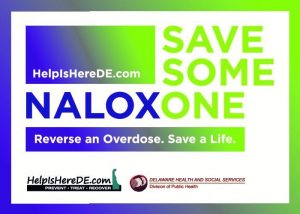
NEW CASTLE (March 13, 2019) – Health and public safety officials are urging people in active use of heroin or other opioids and their families to seek immediate treatment and acquire the overdose-reversing medication naloxone on hand in the wake of three suspected heroin overdose deaths in five days in Sussex County involving the same packet stamp.
Through death investigations, the Division of Forensic Science identified the same stamp on packets that are suspected of being used by the three individuals or were found at the scenes of their deaths. The division is doing toxicology testing of the substances involved. The stamp is not being identified to prevent people in active use from seeking it.
The three suspected overdose deaths happened in Sussex County between March 9 and March 13, the Division of Forensic Science staff reported. As of today, March 13, the Division of Forensic Science has reported a total of 50 suspected overdose deaths in Delaware this year. Preliminary estimates for 2018 indicate 419 overdose deaths across the state, an increase of 21 percent from the 2017 total of 345 deaths.
“While the Division of Forensic Science determines the particular chemical make-up of the substances involved in these deaths, it is critical that people be aware of the dangers,” Department of Health and Social Services (DHSS) Secretary Dr. Kara Odom Walker said. “If you have a loved one in active use, please have naloxone in your home. If you see someone overdose, call 9-1-1 immediately, begin rescue breathing and administer naloxone, which can reverse the effects of an opioid overdose, and save the person in distress.”
“Naloxone saves lives,” said Division of Public Health Director Dr. Karyl Rattay. “With specific heroin packets appearing to be extremely dangerous, we urge anyone who needs access to naloxone to connect with Brandywine Counseling & Community Services, which operates the syringe services program for the Division of Public Health, attend a Community Naloxone Training class provided by Brandywine Counseling, come to one of the Division of Public Health’s free naloxone distributions or go to a participating pharmacy to buy the overdose-reversing medication. We also urge Delawareans to download OpiRescue Delaware, a new smartphone app that provides lifesaving step-by-step instructions on how to administer naloxone.” For more information, go to www.HelpIsHereDE.com and click on the overdose prevention tab.
In 2018, first responders administered 3,728 doses of naloxone, compared with 2,861 doses in 2017, a 30 percent increase.
Elizabeth Romero, director of the Division of Substance Abuse and Mental Health, urged individuals in active substance use to see a medical provider immediately or call DHSS’ 24/7 Crisis Services Hotline to be connected to trained crisis professionals who can discuss treatment options. In New Castle County, the number is 1-800-652-2929. In Kent and Sussex counties, the number is 1-800-345-6785. Individuals and families also can visit DHSS’ website, www.HelpIsHereDE.com, to find addiction treatment and recovery services in Delaware and nearby states.
Romero encouraged anyone who is using or suffering from addiction to call for help, see a medical provider, or to ask a police officer or another first responder for help. “Too many times, our police officers and other first responders see first-hand the dangers of fentanyl-related overdoses,” she said. “Our first priority is to save lives.”
Under Delaware’s 911/Good Samaritan Law, people who call 9-1-1 to report an overdose and the person in medical distress cannot be arrested for low-level drug crimes.
In 2017, the Division of Forensic Science (DFS) confirmed the presence of fentanyl in 210 of the 345 total fatal overdoses. Fentanyl is a synthetic painkiller that is up to 50 times more potent than heroin. In 2016, fentanyl was confirmed in 109 of the 308 total overdose deaths. The 2018 statistics are expected to be released later this year.
Drug dealers sell fentanyl in a variety of ways, according to the Drug Enforcement Administration (DEA). Dealers sell pure fentanyl in white powder form to users who assume they are buying heroin. They lace cocaine or heroin with fentanyl. And they press fentanyl into pills and pass them off as OxyContin.
When a user ingests fentanyl or a drug laced with fentanyl, it affects the central nervous system and brain. Because it is such a powerful opioid, users often have trouble breathing or can stop breathing as the drug sedates them. If someone is too drowsy to answer questions, is having difficulty breathing, or appears to be so asleep they cannot be awakened, call 9-1-1 immediately, start rescue breathing and administer naloxone if you have it at home.